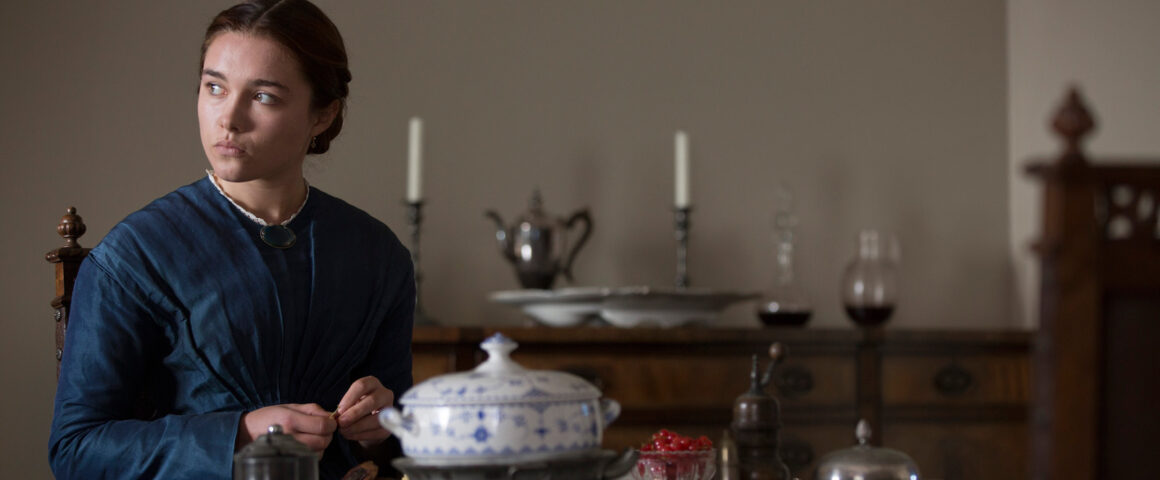Lady Macbeth is an exercise in contradiction. It is a costume drama, a genre long associated with restraint and composure. It is also a gothic romance, which has a long association with passion and melodrama. These generic tropes work together as the passion of the melodrama pushes against the constraints of the costume drama, often through the figure of the female protagonist who is literally contained by her corset.
The boxes for a costume drama are checked off by the films’ setting of 19th century England, its characters of landed gentry, industrial magnates and servants and its locations including a grand manor house and desolate moors. It also possesses gothic elements such as an imprisoned heroine, forbidden love and dark secrets. However, rather than constructing the film melodramatically, director William Oldroyd contradicts the hyperbolic subject matter with a rigidly constrained style, imposing further controls beyond those of the costume drama setting. Carefully composed shots capture the characters in strictly laid out mise-en-scene, presenting aesthetic beauty that is dependent upon tight control. Yet behind the eyes of these characters lurk strong desires, both in favor of and in opposition to this composure.
The film’s generic and stylistic credentials are explicated from the opening shot, as our protagonist Katherine (Florence Pugh, “The Falling”) appears in close-up, her face obscured by a wedding veil while the ceremony is kept out of shot and the words of the ceremony spoken by an unseen cleric. Here is a woman positioned, designated and dictated to by male forces so remote from her that she is not even seen with them – her entire role, at least initially, is to appear as she is bidden. Later, we see her being tied into a corset by maid Anna (Naomi Ackie, “The Five” TV series), but also being ordered to undress by her husband Alexander (Paul Hilton, “Doctor Faustus”), who does little more than look at her and (again offscreen) masturbate. Nor is she expected to speak except when spoken to or venture outside, despite her protestations that she prefers the fresh air. Perhaps unsurprisingly, Katherine proves less than obedient when left alone by Alexander and her father-in-law Boris (Christopher Fairbank, “Guardians of the Galaxy”), finding human connection with Anna and passion with stable hand Sebastian (Cosmo Jarvis, “The Habit of Beauty”).
Oldroyd’s visual style expresses Katherine’s connections visually, as she rarely shares shots with Alexander, but often does with Sebastian. As noted, however, the visuals sometimes seem at odds with a story shot through with energy and passion. Long takes, static shots and a drab mise-en-scene perpetuate Lady Macbeth, resulting in some unsettling sequences as there are many points in the film where a camera movement could release the tension, and this lack of release is discomfiting. The result of this dramatic tension is a superbly evocative atmosphere, helped considerably by the remarkable sound design of the film that emphasizes wind on the moors, floorboards, doors cutlery and crockery in the house, and at times the physical interactions of human bodies both in acts of pleasure and pain.
As Katherine, Florence Pugh is a mesmerizing protagonist. At first downtrodden and largely mute, she gradually blossoms into a fiercely determined creature of intent and Machiavellian cunning, displaying all that the film’s title implies. Naomi Ackie provides sterling support as Anna, similarly downtrodden but developing a form of albeit passive resistance. As Boris the stepfather, Fairbanks is suitably cruel and contemptuous, while Alexander is deeply contemptible thanks to Hilton’s portrayal of him as a dissolute and threadbare louche. As Sebastian, Cosmo Jarvis injects much needed energy into the film as well as Katherine’s life, and also provides maybe the strongest conscience in the film. There is little coddling to audience sympathies, the film demanding that we either accept the characters in their rather dubious states or not. Both Boris and Alexander frequently display abusive behavior, but the film does not sanitize its ostensible “heroes.” Katherine’s arc is one of developing independence, but darkness and malevolence grows within her, culminating in a deeply unsettling sequence that, again, is captured in a single long take.
Overall, however, Lady Macbeth works as a historical psychological drama, the characters constituting strong representatives of their social class. The oppressed, be they women or members of lower class, can either be submissive and servile or find ways to live within that. Therefore, even if we do not agree with let alone forgive their actions, they are at least understandable, and the final, inscrutable shot dares the viewer to consider what they might do in a similar situation. The film also suggests that such responses may not be unreasonable in the face of such rampant and unapologetic oppression, Katherine treated as little more than a slave, so even when her actions are questionable, her situation is understandably dire. Lady Macbeth may not be the most comfortable watch, but it is an engrossing and compelling one.




'Movie Review: Lady Macbeth (2016)' has 1 comment
June 2, 2017 @ 9:49 am rackfat
WHat is the connection to the Shakespeare play?